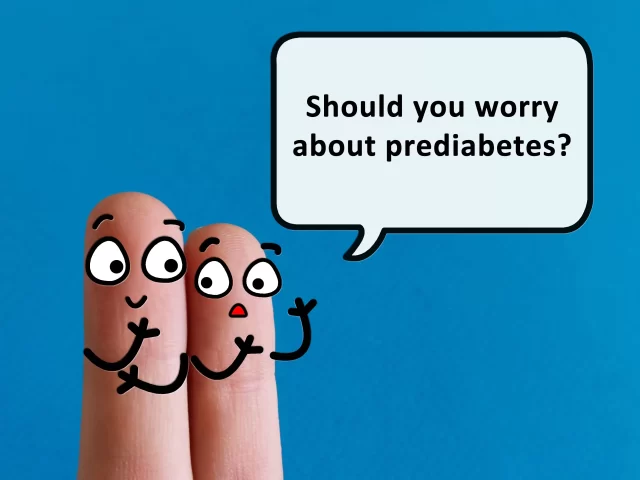Here’s Why Prediabetes Is More Serious Than You Think

Do you have blood sugar levels that are higher than normal but not high enough to be considered diabetes? If so, you have prediabetes. Many people don’t think much about having elevated blood sugar numbers as long as they don’t have diabetes. But knowing what to do if your blood sugar is out of normal range can be an important step in helping you to stay healthier.
What is prediabetes?
Having prediabetes means that your blood sugar is higher than normal but is not yet high enough to receive a diagnosis of type 2 diabetes. Blood sugar levels may be measured after doing an overnight fast, with results indicating the following:
- Normal: 99 mg/dL or lower
- Prediabetes: 100 to 125 mg/dL
- Diabetes: 126 mg/dL or higher
You may also have an A1C test done. This measures your average blood sugar levels over the past 2 to 3 months. Results of an A1C test are as follows:
- Normal: below 5.7%
- Prediabetes: 5.7% to 6.4%
- Diabetes: 6.5% or higher
Would you know if you had prediabetes?
As many as one in three American adults have prediabetes. Unfortunately, about 8 in 10 people with prediabetes don’t even know they have it. This makes it less likely they’ll make lifestyle changes needed to prevent the development of full-blown type-2 diabetes in the future.
You may have no symptoms if you have prediabetes. The only way to know for sure if you have prediabetes is to have your blood sugar levels checked. Talk to your doctor about getting tested if you have these risk factors:
- You are age 45 or older
- You are overweight
- You are not physically active
- You had gestational diabetes when pregnant or gave birth to a baby over 9 pounds
- You have a close relative (parent or sibling) with type 2 diabetes
Why is it serious to have prediabetes?
Having prediabetes is a sign that you’re more likely to develop diabetes in the future (although it’s not a guarantee that you will). Diabetes affects every major organ in your body. It increases your chance of heart disease, stroke, kidney failure, blindness and nerve damage. Not only can it affect your physical health and how long you live, but it can also affect your quality of life. In fact, people with diabetes are twice as likely to experience depression.
In addition to being a wake-up call that you may develop diabetes, having prediabetes also puts you at a higher risk of heart disease and stroke.
What can you do if you have prediabetes?
The best thing you can do if you have prediabetes is to make lifestyle changes that may lower your risk of developing diabetes. This includes:
- Losing weight. Losing just 5 – 7% of your body weight can make a difference.
- Eating healthier foods. Changing your diet may lower your chance of developing diabetes. Eat more fruit, vegetables, whole grains, lean meats, nuts and low-fat dairy. Reduce your consumption of added sugar, white flour, processed foods and foods high in saturated fat.
- Moving more. Aim to get at least 150 minutes per week of moderate activity, such as brisk walking.
- Checking your blood sugar regularly. Once you know that your levels are elevated, it’s a good idea to have your blood sugar levels checked on a regular basis. Your doctor may want to do this once a year or more often.
Copyright 2022-2023 © Baldwin
Publishing, Inc..
Health eCooks™ is a designated
trademark of Baldwin Publishing, Inc. Any duplication or distribution of the information contained herein without
the express approval of Baldwin Publishing, Inc. is strictly prohibited.